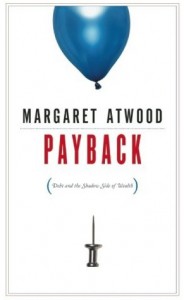“Payback,” by Margaret Atwood
 A while back I promised I’d start writing some about books on this site, since I get so many email requests from people looking for book suggestions. I should clarify that I’m not going to review or even recommend books, per se. I’m just going to write, on occasion, about stuff I’ve read lately — whether for pleasure or for work-related obligation. Hopefully I’ll say enough, coherently enough, that you can decide for yourself whether any given book I bring up is something for you to pursue further on your own. I’ll try a couple of these and see how — or if — you react, and decide from there whether to change it up (or even whether I should keep it up).
A while back I promised I’d start writing some about books on this site, since I get so many email requests from people looking for book suggestions. I should clarify that I’m not going to review or even recommend books, per se. I’m just going to write, on occasion, about stuff I’ve read lately — whether for pleasure or for work-related obligation. Hopefully I’ll say enough, coherently enough, that you can decide for yourself whether any given book I bring up is something for you to pursue further on your own. I’ll try a couple of these and see how — or if — you react, and decide from there whether to change it up (or even whether I should keep it up).
I’ll start with Margaret Atwood’s Payback: Debt and the Shadow Side of Wealth. I read it while preparing a recent-ish column. Adapted from a set of six lectures she gave in 2008, it’s very entertaining, full of interesting information, and wonderfully written.
Obviously Atwood’s subject is debt, as an idea. Near the beginning she writes: “We seem to be entering a period in which debt has passed through its most recent harmless and fashionable period, and is reverting to being sinful.” As she demonstrates, debt as sinful, or at least shameful, notion, certainly has quite a history. But over time, that’s changed — as cultural shorthand examples she notes that while Marlowe’s Faustus was guilty of over-spending, Dickens’ Scrooge was guilty of over-saving. In Scrooge’s redemption via dropping his hoarding, miserly ways, there echoes a new ethos, Atwood argues: “Money … is of use only when it’s moving, since it derives its value entirely from whatever it can translate itself into. … [C]urrency is called ‘currency’ because it must flow.”
She concludes by turning to other sorts of costs incurred and debts owed — to the planet, for instance. She returns to re-examine Scrooge.
[B]eing a creditor of such magnitude in the financial sense, he has himself become a debtor in the moral sense, and it’s this realization that’s at the core of his transformation. Money isn’t the only thing that must flow and circulate in order to have good value: good turns and gifts must also flow and circulate …. for any social system to remain in balance.
And here she posits a contemporary creature known as Scrooge Nuoveau, who does spend money: “On himself.”
“It’s not his fault that he’s a self-centered narcissist: he grew up surrounded by advertisements that told him he was worth it, and that he owed it to himself,” Atwood writes. This figure – who “his own debtor and creditor rolled into one” — is clearly a stand-in for the Western consumer. By and large the point she makes here is the costs being piled up in the destruction of the earth — someday, we’ll pay.
For me that idea of how Scrooge 2.0 thinks about debt — what he owes to himself — is the lasting insight. I think something close to this sentiment did indeed drive a lot of consumer debt-abuse in recent years (and probably still drives a lot of spending even now). I think I’ve said this before, but to me the key question isn’t always what we want vs. what need, but rather what we feel we deserve.




 "
"












 Kim Fellner's book
Kim Fellner's book  A
A
Reader Comments
yes, it’s a great little book. she’s such a great writer. the money must move quote was one of my favorites too.